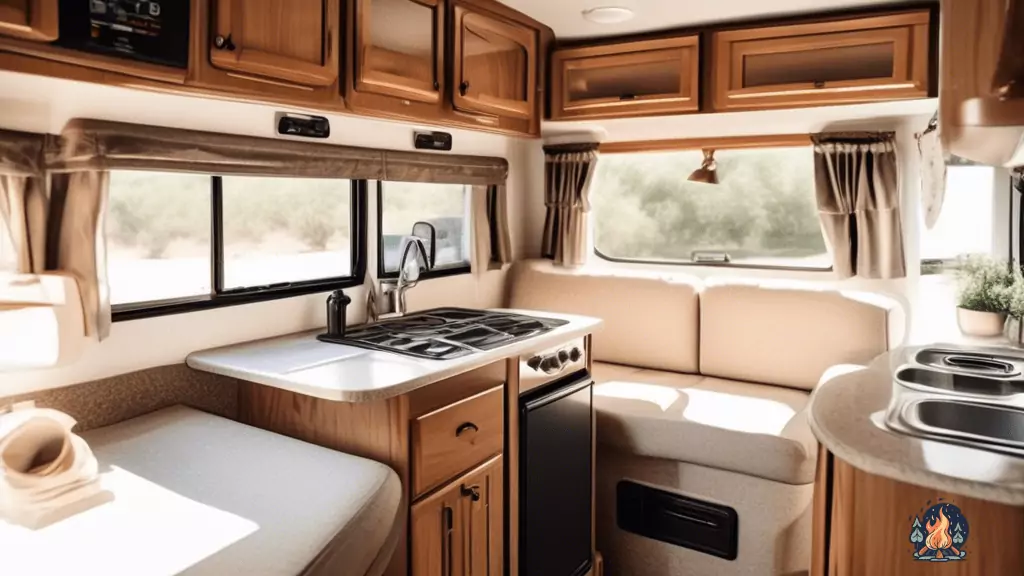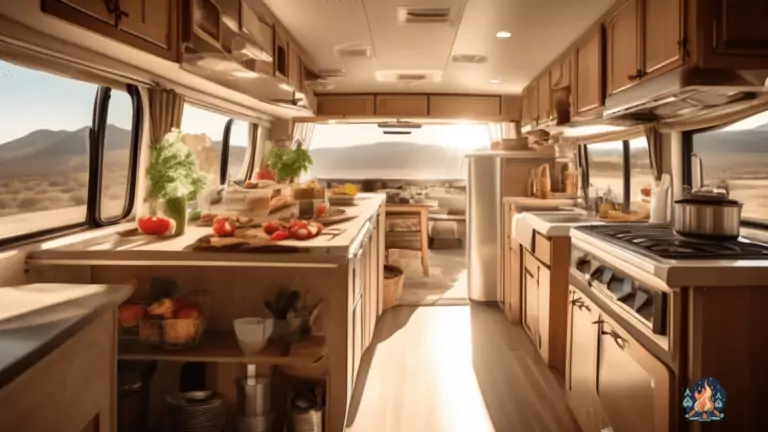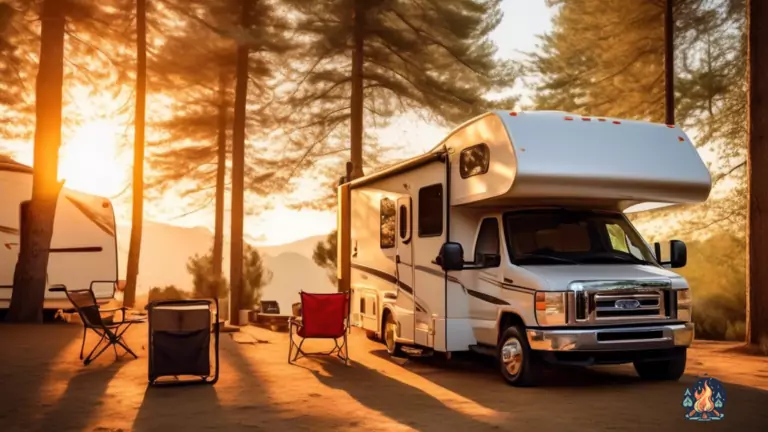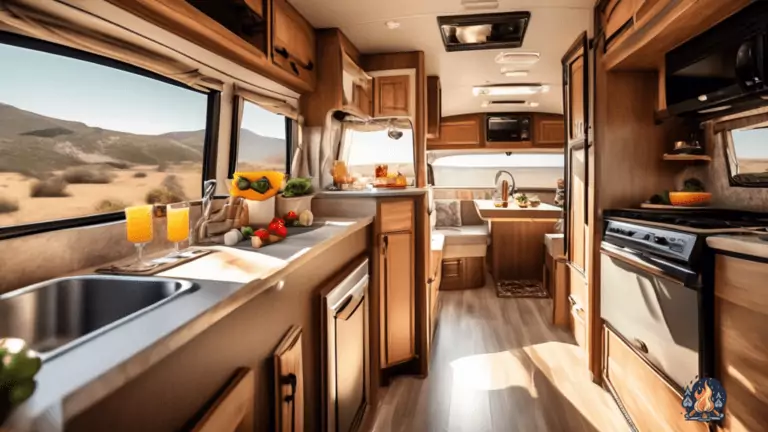Important RV Propane Safety Tips For Beginners
by Kevin Fairbanks • Updated: January 21, 2024
Stay safe on the road with these essential RV propane safety tips. Learn how to protect yourself and your loved ones while enjoying a worry-free adventure. Click here to discover the key safety measures you need to know!

Are you new to the world of RVing and eager to hit the open road? Well, before you start planning your epic adventures, it’s important to familiarize yourself with RV propane safety.
You see, propane is the lifeblood of your RV, providing fuel for your appliances and heating systems. But if mishandled or neglected, it can also be a potential danger. Don’t worry, though, we’ve got you covered!
In this article, we’ll walk you through some important RV propane safety tips that every beginner should know. So buckle up and get ready to learn how to keep your RV propane safe and your adventures worry-free!
First things first, let’s get to know propane a little better. Propane is a highly flammable gas that’s commonly used in RVs for cooking, heating, and powering various appliances. It’s like the life force of your RV, keeping you warm during chilly nights and your food deliciously cooked.
However, it’s crucial to handle and store propane tanks with care. Trust us, you don’t want to mess around with this stuff! We’ll show you the proper way to handle and store propane tanks, as well as how to perform regular inspections and maintenance to ensure everything is in tip-top shape.
So get ready to become a propane pro and keep your RV running smoothly and safely.
Understanding Propane and its Uses in RVs
So, you’ve got your brand new RV and you’re ready to hit the road – but do you know the ins and outs of propane and how it’s used in your vehicle? Well, let me enlighten you, my friend.
Propane is like the lifeblood of your RV, it’s what powers your stove, your fridge, and even your water heater. It’s basically the fuel that keeps your adventure machine running smoothly. Without propane, you’d be eating cold sandwiches, drinking warm beer, and bathing in freezing water. And let’s be honest, no one wants that.
So, it’s important to understand how propane works and how to use it safely in your RV.
Now, I know what you’re thinking – "How the heck do I use propane safely?" Well, don’t worry, I’ve got your back.
First things first, always make sure to check for leaks before using propane in your RV. You don’t want to be the person who sets their RV on fire because they didn’t take the time to do a simple leak check. Trust me, burnt marshmallows are not worth it.
Secondly, when you’re using propane appliances, make sure to keep the area well-ventilated. Propane may be a magical fuel, but it can also be a bit stinky and produce carbon monoxide, which is not a gas you want to be breathing in large quantities. So crack a window or two and let that fresh air in. Plus, it’ll help get rid of any funky smells from your last cooking adventure.
Proper Handling and Storage of Propane Tanks
When handling and storing propane tanks, make sure to carefully position them upright in a well-ventilated area, away from any potential sources of ignition or heat. You don’t want to accidentally turn your RV into a fiery inferno, do you?
I mean, sure, camping can be intense, but that’s taking it a bit too far! So, find a nice spot for your propane tanks where they can stand tall and proud, without any chance of tipping over and causing a disaster.
And remember, it’s not just about their position, but also about the company they keep. Keep those tanks away from open flames, hot surfaces, and anything that could potentially ignite them. Trust me, you don’t want to be the person who turns a quiet camping trip into a scene from an action movie.
Performing Regular Inspections and Maintenance
Performing regular inspections and maintenance is crucial to ensure the safe operation of your RV’s propane system. Just like a car needs regular tune-ups to keep running smoothly, your RV’s propane system also requires regular attention. By inspecting and maintaining your propane system, you can catch any potential issues early on and prevent them from turning into major problems.
To help you stay on top of your RV’s propane system maintenance, here’s a handy table to guide you:
| Maintenance Task | Frequency | Fun Fact |
|---|---|---|
| Check for Leaks | Monthly | Did you know that propane is odorless? An odorant is added to make it detectable in case of leaks. |
| Inspect Hoses and Lines | Before trips | Propane hoses and lines can deteriorate over time, so it’s important to check them regularly for any signs of wear or damage. |
| Clean Burner Assembly | Annually | A dirty burner assembly can affect the efficiency of your propane system. Cleaning it regularly will help maintain optimal performance. |
Remember, these are just a few examples of the maintenance tasks you should perform on your RV’s propane system. Be sure to consult your RV owner’s manual for a complete maintenance checklist. And don’t forget to have fun while inspecting and maintaining your propane system – after all, a little humor can make any task more enjoyable!
Safe Usage of Propane Appliances in an RV
Using propane appliances in your RV can create a cozy and convenient atmosphere during your travels. However, it’s important to use them safely to avoid any mishaps that could put a damper on your trip.
So, here are some tips to keep in mind while using propane appliances in your RV.
First and foremost, always make sure to check for any leaks before using your propane appliances. You definitely don’t want any unexpected surprises when you turn on that stove or heater! To check for leaks, simply mix some dish soap with water and apply it to the connections and hoses. If you see any bubbles forming, that’s a sign of a leak and you should address it immediately.
When using your propane appliances, it’s also important to ensure proper ventilation. Propane burns clean, but it does produce carbon monoxide, which can be deadly if inhaled in high concentrations. So, make sure to open a window or vent while using your appliances to allow fresh air to circulate. And of course, never use your propane appliances for heating purposes while sleeping. Trust me, waking up to a headache is not the cozy feeling you were going for!
So, remember to check for leaks, provide proper ventilation, and never use propane appliances for heating while sleeping. Following these safety tips will ensure that you can enjoy the convenience and coziness of propane appliances in your RV without any worries. Happy travels and stay safe!
Emergency Procedures and Safety Precautions
In the event of an emergency, it’s crucial to know the proper procedures and precautions to ensure your safety while using propane in your RV. We all hope that emergencies never happen, but it’s better to be prepared just in case.
Here are some important tips to keep in mind:
- Stay calm: Panicking never helps in any situation, so take a deep breath and try to stay calm. Remember that you have the knowledge and skills to handle this situation.
- Shut off the propane: If you smell gas or suspect a leak, the first thing you should do is turn off the propane supply. Locate the propane tank and turn the valve clockwise until it’s fully closed. This will stop the flow of gas and prevent further danger.
- Ventilate: Open all doors and windows in your RV to allow fresh air to come in. This will help to dissipate any gas that may be present. If the smell is strong or you feel lightheaded, it’s important to get out of the RV and seek fresh air immediately.
- Call for help: If you’re unable to control the situation or you’re experiencing a serious emergency, don’t hesitate to call for professional help. Contact your local fire department or emergency services for immediate assistance.
Remember, safety should always be your top priority. By following these emergency procedures and safety precautions, you can ensure a safe and enjoyable RV experience.
Stay safe and happy travels!
Frequently Asked Questions
What are the different types of propane appliances commonly found in RVs?
In your RV, you’ll find a range of propane appliances to make your life on the road cozy and convenient. From stoves and ovens to water heaters and refrigerators, these gadgets are the secret sauce to your camping adventures!
How often should propane tanks be inspected and tested for leaks?
You, dear propane enthusiast, should inspect and test your tanks for leaks every year. Like a detective on the hunt, give those tanks a thorough check-up to ensure your RV adventures stay safe and leak-free!
Are there any specific guidelines for transporting propane tanks in an RV?
When it comes to transporting propane tanks in your RV, safety is key! Make sure to secure them properly, keep them upright, and never leave them unattended. Remember, a propane tank rolling around is no laughing matter!
Can propane tanks be refilled or exchanged at any gas station or are there specific locations for this?
Propane tanks are like precious jewels, needing the right hands to handle them. While not all gas stations offer refills or exchanges, there are specific locations, like propane filling stations or hardware stores, where you can safely replenish your tanks.
What are some common signs of a propane leak in an RV and how should it be addressed?
If you detect a propane leak in your RV, don’t panic! Look out for the unmistakable smell of rotten eggs and listen for hissing sounds. Quickly shut off the gas supply and ventilate the area. Then call for help and give your RV a new nickname: u0026quot;Leaky McLeakface.u0026quot; Safety first, right?

Hi, I’m Kevin, a lifelong camping enthusiast and the voice behind Campfire Discoveries. From tent to RV to cabin camping, I’ve explored it all. Join me as we share stories and tips around the campfire, deepening our connection with the great outdoors.
Keep Reading
-
Mastering RV Meal Planning: Tips And Tricks For Easy Cooking
Make cooking in your RV a breeze with our expert tips and tricks for mastering RV meal planning. Discover hassle-free ways to plan delicious meals on the go. Click here to start simplifying your RV cooking experience!
-
A Comprehensive RV Safety Checklist For Beginners
Planning your first RV adventure? Don’t forget to check out this comprehensive RV safety checklist for beginners! Click now to ensure a stress-free and worry-free trip.
-
Quick And Easy RV Dinner Ideas For Delicious Meals On The Road
Tired of bland meals on your RV trips? Discover these mouthwatering quick and easy RV dinner ideas that will satisfy your taste buds on the road. Click now for delicious meals to make your adventures even more memorable!



